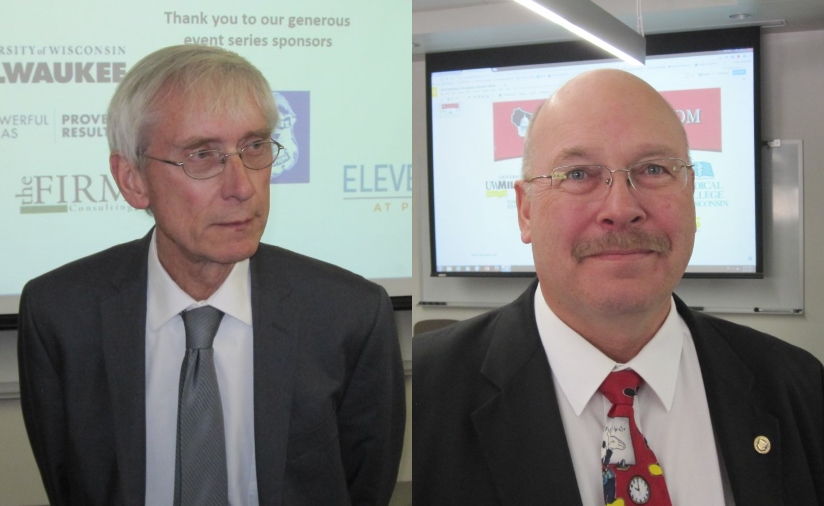Can Holtz Beat Evers?
Incumbent Superintendent Evers worries that dark money will rescue Holtz.
Lowell Holtz is the embodiment of the educational establishment in Wisconsin.
He has a masters in educational administration at UW-Madison and a doctorate in educational leadership from Concordia University. He worked for three decades as an educator, starting as an elementary school teacher, with two stints as an elementary school principal (in the Cambridge and Peshtigo school districts) and three tours as a district superintendent (in Palmyra, Beloit and locally at Whitnall). He earned good salaries and prospered as a traditional educator.
Yet Holtz is now running as insurgent candidate against incumbent state Superintendent of Public Instruction Tony Evers. After spending nearly three decades working in public schools, Holtz wants to increase the number of voucher schools (where salaries for staff are much lower), wants unlimited “free market competition” between public and private schools, and has pushed a plan to overthrow elected school boards in Milwaukee, Madison, Racine and Kenosha. He now opposes the Common Core standards used throughout the state, which he previously supported.
Evers calls Holtz a “political opportunist” who has changed his views on education to gain the support of Republicans and conservatives who want to expand choice and charter schools. Holtz ran for state superintendent in 2009, but finished last in the primary.
In short, voters could hardly have a clearer choice in this race. Evers will likely get heavy support from Democrats, Holtz from Republicans. There’s little the two agree on (though they once did). And those differences may get all the starker, if last-minute “dark money” from anonymous conservative groups gets spent on attack ads against Evers.
Certainly Evers is fearful of this. “I saw it happen in other campaigns,” he says, pointing to last November’s election, where “out of state, last-minute money in legislative campaigns absolutely destroyed candidates.”
But Holtz might be too weak a candidate to attract such money. And so far it’s Evers who is the fat cat: The AP reports Evers has raised nearly $218,000 from Feb. 7 through March 20, compared with $87,000 for Holtz. Most of Evers’ cash has come from unions and most of Holtz’s from corporate leaders, as Urban Milwaukee has reported.
Evers is older (65 years old) than Holtz (59), taller (6’2”) than the challenger (6 foot) and thinner, favoring bicycling and stair climbing for exercise, while Holtz favors walking. Both are native cheeseheads: Evers grew up in Plymouth and Holtz in Milwaukee.
Both are married to their high school sweetheart, and both wives are educators (Susan Holtz has a doctorate in education.) But while Evers’ three children attended public schools, Holtz says his children attended both public and parochial schools, citing that as a benefit of having choices for your kids.
Neither has worked in a classroom for years: for Holtz it was back in 1983, for Evers in 1979. Like Holtz, Evers has been part of the educational establishment for decades and also served as a teacher, principal and school district superintendent, before joining DPI 16 years ago, including the last 8 years as state superintendent.
Evers has served at a time of massive upheaval in Wisconsin, as the Act 10 law successfully passed by Gov. Scott Walker has lowered compensation for teachers and other public employees and decimated their unions. The Wisconsin Education Association Council, the state teachers union, is now a shell of itself. It backs Evers, but its campaign donations are far lower than in the old days, and could be easily overwhelmed should a blitz of right-wing dark money be launched.
Evers blames Act 10 and the “assault on public education” for causing a shortage of teachers, particularly in rural areas, and a continuing decline in education majors at universities in the state. Act 10, he says, “pitted public employees against others and that demonizing has continued. We need to stop that. Who wants to be in a profession where you walk around with a target on your back?”
Holtz says “the climate and culture got out of hand after Act 10,” but blames DPI and Evers for the decline in respect for teachers and says Evers is more concerned about teachers unions than teachers. Yet it is Holtz who seems unconcerned about a decline in pay for teachers.
“It’s not always about money,” Holtz says. He cites a never-released, “informal” survey by the Wisconsin Association of School Boards which he says found money was not the main reason teachers were leaving the profession. (Update, Dan Rosmiller, Government Relations Director for the Wisconsin Association of School Boards, says in comments below that he knows of no such survey.)
“We have excellent teachers who are leaving because of the bureaucracy heaped upon them,” Holtz contends, referring to paperwork teachers must do to comply with the state Educational Effectiveness standards.
Says Evers: “DPI continues to try and lighten the load on teachers where ever possible, including a new proposal we rolled out in December to modify Educator Effectiveness, but the fact remains that Educator Effectiveness has been put in place by the legislature. It is the law.”
Evers says the expanding voucher program is siphoning money from public education to subsidize private schools. Past data has shown as many as 75 percent of students getting vouchers were already attending private schools.
Holtz says “it’s good to have options” for families, adding “I’m not afraid of competition.”
Holtz has made the state’s black-white achievement gap a major issue, but the problem is the greatest in Milwaukee, which has perhaps more voucher students than any city in the country. Yet he continues to push this as a solution to problem.
Another change he favors is quite unprecedented. Holtz and John Humphries, who lost in the February primary race, had shared documents with each other proposing that whoever lost would hire the other to work in DPI. They also proposed the winner for superintendent should be able to take “complete authority over Milwaukee, Racine, Kenosha and Madison,” and perhaps Green Bay, according to the document Holtz shared, with authority to “Change boards” and “Break apart districts.”
Holtz has a history of controversies during his years as an educator, as Scott Bauer of the Associated Press has reported: Records from the school districts where he worked “show Holtz repeatedly clashed with the (school) boards by allowing a film crew for then-candidate Barack Obama to get footage of students in Beloit, hiring his wife to work at Beloit, donating football field bleachers from Whitnall to a private school his children attended and not communicating quickly enough about a Whitnall employee who used a computer to facilitate a sex crime. Before he was a superintendent, Holtz was fired from his job as an elementary school principal in the Cambridge district in 1995 after working there six years, but he disputes the reasons why.”
As for Holtz’s stand on the Common Core standards, as an administrator at Whitnall, he embraced them, saying “The change is absolutely in the best interests of the kids of Wisconsin. Raising the bar will make our kids more competitive not only at the state level but at the national level.” He called it a “fun, exciting time to be involved in education.”
Now Holtz criticizes the Common Core as a set of standards “created in Washington” that should be replaced with a state-created system.
Evers, too, has modified his views over the years, as Wisconsin State Journal reporter Molly Beck has reported. Back in the 1990s, as an administrator of CESA 6 in Oshkosh, a regional organization that provides services for schools, Evers discouraged his employees from unionizing. And in the early days of vouchers, he favored it as an experiment in Milwaukee.
Nowadays he opposes vouchers and stands up for teacher unions. Both candidates, it seems, have been pushed further from the center as Wisconsin becomes ever more politically polarized.
Murphy's Law
-
Top Health Care Exec Paid $25.7 Million
 Dec 16th, 2025 by Bruce Murphy
Dec 16th, 2025 by Bruce Murphy
-
Milwaukee Mayor’s Power in Decline?
 Dec 10th, 2025 by Bruce Murphy
Dec 10th, 2025 by Bruce Murphy
-
Total Cost of Foxconn Is Rising
 Dec 8th, 2025 by Bruce Murphy
Dec 8th, 2025 by Bruce Murphy























In the interest of accuracy in reporting, I have no idea what “informal survey” Dr. Holtz is talking about. I am not aware that the Wisconsin Association of School Boards has ever conducted such a survey, whether formal or informal. Dr. Holtz may be thinking of another survey, but, if so, it was not one conducted by the Wisconsin Association of School Boards.
Dan Rossmiller
Government Relations Director
Wisconsin Association of School Boards
Here is an excellent read on the public, voucher, charter school dilemma which basically finds that charter schools and voucher schools do not help and basically actually hurt all education for our children, our society, and the best answer is to work to improve g with more pre-school programs and at school and after school programs .Voucher and charters are not the answer!
In the only area in which there is evidence of small improvements in voucher schools—in high school graduation and college enrollment rates—there are no data to show whether the gains are the result of schools shedding lower-performing students or engaging in positive practices. Also, high school graduation rates have risen sharply in public schools across the board in the last 10 years, with those increases much larger than the small effect estimated on graduation rates from attending a voucher school.
The lack of evidence that vouchers significantly improve student achievement (test scores), coupled with the evidence of a modest, at best, impact on educational attainment (graduation rates), suggests that an ideological preference for education markets over equity and public accountability is what is driving the push to expand voucher programs. Ideology is not a compelling enough reason to switch to vouchers, given the risks. These risks include increased school segregation; the loss of a common, secular educational experience; and the possibility that the flow of inexperienced young teachers filling the lower-paying jobs in private schools will dry up once the security and benefits offered to more experienced teachers in public schools disappear.
The report suggests that giving every parent and student a great “choice” of educational offerings is better accomplished by supporting and strengthening neighborhood public schools with a menu of proven policies, from early childhood education to after-school and summer programs to improved teacher pre-service training to improved student health and nutrition programs. All of these yield much higher returns than the minor, if any, gains that have been estimated for voucher students.
http://www.epi.org/publication/school-vouchers-are-not-a-proven-strategy-for-improving-student-achievement/
Bruce, loved your tale of the tape. YOU failed to mention their weights. Mass. Gravitas. Mas gravitas? ANyhow, you failed to answer your headline question. I would guess you thinkk not. BUt one tweet from Trump and HOltz would rock ’em sock ’em. Courtney needs to call Priebus and press that button.